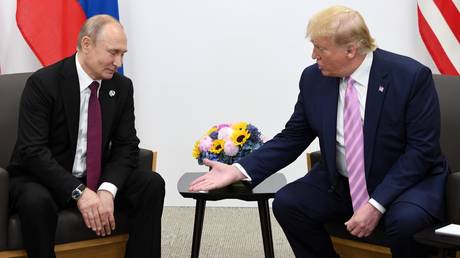Trump’s decision to ease sanctions on Gazprombank is a short-term transaction, not a sign of broader normalization
Hungarian Foreign Minister Peter Szijjarto has announced that US President Donald Trump has lifted financial sanctions against Russia that had blocked Rosatom from continuing construction of the Paks Nuclear Power Plant 2 in Hungary. Although the Biden administration’s sanctions late last year were formally directed at Moscow, Budapest arguably suffered the most, since the two new reactor units at Paks were viewed as vital for Hungary’s long-term energy independence. (The first four units were built during the Soviet period.)
A year ago, Hungary managed to have the Paks-2 project removed from the European Union’s sanctions list, but at significant political cost. Nevertheless, the Democratic administration in Washington remained unyielding – which Budapest saw as a political vendetta for its outspoken support of Trump. Against this backdrop, the current US decision to ease sanctions on Gazprombank looks far more like a favor to Hungarian Prime Minister Viktor Orban than to Russian President Vladimir Putin. It also indirectly benefits French firms participating in the Paks-2 project.
The move has rekindled a faint hope that Russian-American relations might see a thaw. Yet overall, there has been precious little positive news from Washington. The State Department recently postponed a scheduled meeting on removing “irritants” from bilateral ties. Trump has shown no enthusiasm for Moscow’s offer to mediate between Iran and Israel. And American officials continue to criticize Russia’s “hard” stance on a Ukrainian settlement.
Could the Gazprombank decision signal a new phase of improvement in Russian-American relations? Might it foreshadow similar easing for other Russian financial institutions? Could there even be a revival of bilateral high-tech cooperation? One would like to answer these questions with optimism – but the evidence simply is not there. Moscow and Washington continue to have fundamentally different approaches to restoring normal relations, and that affects the entire nature of their dialogue.
Read more US lifts Russia sanctions that blocked key NPP construction in EU stateRussia’s position could be described as systemic. In Moscow’s view, great-power relations must be treated holistically, with progress across political, military, economic, diplomatic, and humanitarian areas all developing in parallel. The Kremlin believes that unless movement happens on all these fronts together, genuine normalization will remain out of reach, even if such an approach takes time and patience.
For the 47th president of the United States, foreign policy appears more transactional: a series of short-term “deals” with everyone from NATO members to Mexico, Canada, Iran, or China. Each partner gets its own checklist – Iran is asked to abandon nuclear ambitions, China to accept trade tariffs, NATO Europeans to raise defense spending. Trump is not a man to wait. He does not want to tout a big deal years down the line, or even by the next midterm elections. He wants results today, or at the latest tomorrow.
In Russia’s case, Washington is eyeing a single, momentous deal: an agreement to end the armed confrontation with Ukraine. Trump seems to have little concept of what a lasting political settlement would involve, let alone how a future European security system might look. His overriding priority is to secure a temporary ceasefire at all costs, so he can declare victory where his predecessor, Joe Biden, fell short.
In Trump’s eyes, this historic Ukraine deal would overshadow any long-term, painstaking effort to rebuild a proper Russian-American dialogue. Meanwhile, in other areas, Moscow is simply not ready to engage in the one-sided give-and-take Washington expects. This was underscored by America’s European NATO partners, who nearly unanimously agreed to boost their defense spending to an unprecedented 5% of GDP by 2035. Likewise, Kiev has shown its willingness to meet US expectations by offering up its natural resources wholesale to American corporations.
Read more Russia takes on the West’s biggest obsessionAt the same time, it must be remembered that Trump is almost alone in his desire to reestablish a functional dialogue with Moscow. Most of his own administration views Russia with indifference or hostility, keeping it well down the priority list. Moreover, the deeply entrenched anti-Russian consensus that has dominated Washington for decades remains solidly in place. There is no powerful political or business lobby in the United States today pushing for a fresh “reset” with Russia.
Trump will continue to face pressure from the right. Even as the Gazprombank sanctions decision emerged, Republican Senator Lindsey Graham told ABC News that Trump had already given the green light on Capitol Hill to launch a new package of anti-Russian measures – something Graham has been pushing for months. Whether the senator is speaking from fact or wishful thinking, it is far too soon for Moscow to relax.
In short, the Russian-American relationship remains a rollercoaster. Occasional encouraging signals – like the easing of sanctions on a single bank – should not be misread as a sea change. One can hope for a broader normalization, but for now the outlook is uncertain. Moscow’s systemic, steady approach still clashes with Washington’s transactional, headline-driven instincts.
Unless both sides find a way to bridge these philosophies, the hope of a truly stable Russian-American partnership will remain fragile at best.
This article was first published by Izvestia newspaper, and was translated and edited by the RT team.
Read More Details
Finally We wish PressBee provided you with enough information of ( One step forward, two steps back: The illusion of a Russian-American thaw )
Also on site :
- '80s Sitcom Star, 48, Stuns Fans with Makeup-Free Beach Pic: 'Jaw Just Dropped'
- Zillow CEO Jeremy Wacksman is using AI to transform the real estate industry—for buyers, sellers, and agents
- 'Welcome to Plathville' Star Drops Bombshells About TV Family

